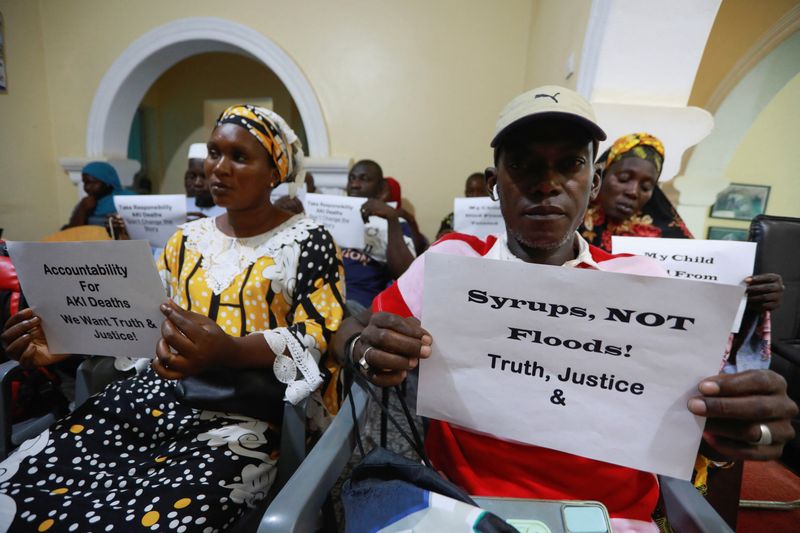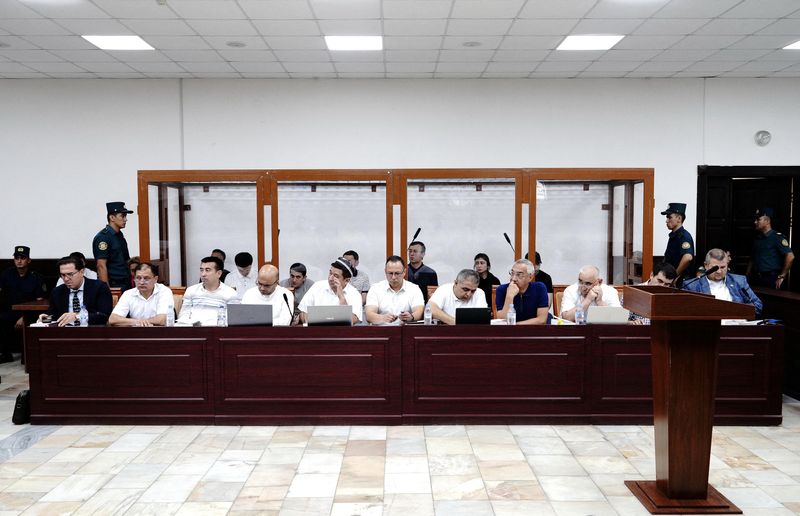(Reuters) - The U.S. FDA is cracking down on lax testing practices by dozens of makers of healthcare products following hundreds of deaths overseas from contaminated cough syrups, a Reuters review of regulatory alerts found.
The Food and Drug Administration has reprimanded at least 28 companies this year, saying they failed to prove sufficient testing of ingredients used in over-the-counter drugs and consumer products for the toxins ethylene glycol (EG) and diethylene glycol (DEG), according to a Reuters analysis of agency import alerts and warning letters to manufacturers.
The manufacturers include U.S.-based companies and exporters from India, South Korea, Switzerland, Canada and Egypt.
The FDA has flagged more manufacturers for failing to test raw materials susceptible to EG and DEG contamination in 2023 than in the previous five years combined, the Reuters analysis found.
The FDA told Reuters it has no indication products contaminated with DEG and EG have entered the U.S. supply chain, and that the number of warning letters issued in a given period "is not a comprehensive marker of our oversight."
Peter Lindsay (NYSE:LNN), a lawyer at Paul Hastings in Washington, D.C. who specializes in FDA regulation and compliance, said to better spot contamination the agency was now requiring manufacturers to check individual containers of ingredients rather than just sampling raw materials.
"They're upping the bar a little bit and trying to get industry to understand and recognize some of the risks in these areas," he said.
Cough syrups made in India and Indonesia have been linked to deaths of more than 300 children globally. The medicines were found to contain high levels of DEG and EG, leading to acute kidney injury and death.
The poisonings have sparked criminal probes, lawsuits and a surge in regulatory scrutiny worldwide. Reuters reported earlier this month that some Indian drugmakers involved could not prove they had purchased pharmaceutical grade ingredients or tested their medicines for the toxins.
In the United States, more than 100 people, most of them children, died in the 1930s from DEG poisoning, prompting laws that greatly enhanced the FDA's regulatory power over drugs.
Yet the agency did not establish explicit rules to test high-risk ingredients like propylene glycol (PG) and sorbitol solution for EG and DEG until May 2023.
Previous guidance from 2007 recommended certain tests be performed on glycerin, another common ingredient in over-the-counter drugs and consumer goods, to prevent distribution of DEG-contaminated products. It now requires the same scrutiny of PG and other high-risk components for DEG and EG.
IMPORT ALERTS
The FDA warning letters give manufacturers an opportunity to fix quality control problems or face penalties.
The letters sent to the 28 U.S. and foreign manufacturers threaten to block either exports or imports of their products and new drug applications from those firms if they do not improve testing practices.
Half of them also received import alerts, which prohibit at-risk products from entering the country by allowing customs officials to detain them without examination.
Eleven of the manufacturers cited by the FDA this year marketed some of their at-risk products to children, including diarrhea and pink eye medicines, toothpaste and sunscreen, according to the letters.
Florida-based Lex, a contract manufacturer of cough and cold medicines that can be used by children, was called out by the FDA on Aug. 17 for lax testing and repeated quality-control violations going back to 2004.
Lex co-owner Charlene Paz said the company has addressed the shortcomings identified by the FDA and is conducting all required tests for impurities whenever they get ingredients susceptible to EG and DEG contamination.
Fourteen foreign manufacturers that sold products susceptible to DEG and EG poisoning were placed on import alert lists for failure to prove sufficient quality control. They include South Korea's LCC, which makes Oriox and other mouthwashes, and India-based toothpaste manufacturers Suhan Aerosol and Orchid Lifesciences.
An LCC spokesperson said the company is in the process of responding to the FDA. Suhan and Orchid said EG and DEG were not found in their products.
Four of the 14 companies were put on an import alert list for not responding to requests for records. They are Daxal Therapeutics and Skyline Herbals from India, and South Korea’s KM Pharmaceutical and Sangleaf Pharma. They could not be reached for comment.
In addition, 13 U.S. makers of consumer products like earwax removers, nasal spray, hand soap and shampoo, including Lex, were threatened with possible seizures and injunctions by the FDA.

The regulator said they had failed to conduct required contamination checks, in several cases relying on suppliers’ certificates of analysis for the purity of their ingredients, among other shortcomings.
Greg Landry, a pharmacology and toxicology expert at Massachusetts College of Pharmacy & Health Sciences, noted the difficulty of policing every consumer product. But when the FDA becomes aware of a problem, he said, "their response is usually swift and mighty." (This story has been refiled to fix a typo in the headline)
